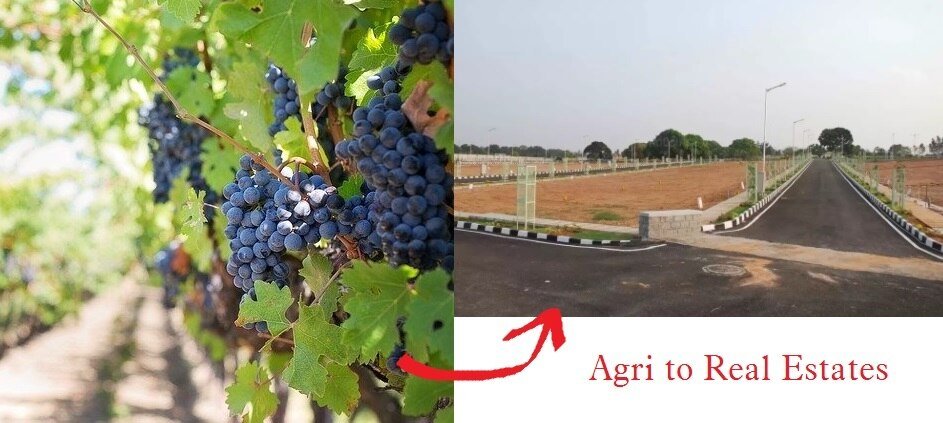Why grape growing farmers are converting their land into residential plots? Farmers anticipate that more farmers will convert their land into residential and commercial plots in order to recoup losses from the previous two years.
A group of farmers in Vijayanagar village in the Sangli district of Maharashtra is busy marking their farmland with cement poles, oblivious to why Punjab and Haryana farmers began the agitation on the Delhi border and why it ended.
Also Read: Pandemic subdued Grape demand, Exporters predict shipment fall 2020-21
The grape-growing region is now dotted with cement pole markings as farmers quit and convert their grape garden land into residential plots.
‘We have suffered significant losses in the last two to three years as a result of unseasonal rains. There was no other option but to cut down vineyards,’ farmers said, adding that while some have turned to sugarcane, others have sold their land for real estate.
‘You hardly find any grape cultivation in this area right now.’ Farmers have suffered due to unseasonal rains, and the increasing cost of cultivation as a result of climate change. Pesticides are too expensive, and grape cultivation is unprofitable. ‘Loan burdens are weighing heavily on farmers,’ says Salim Kanwade.
Salim is experimenting with tomatoes, brinjal, and sugarcane. He is trying to sell his produce on his own in the Miraj market because traders don’t pay the justifiable price to his produce. However, due to unseasonal rains, even vegetable cultivation has become a loss-making endeavor.
Salim anticipates that more farmers will convert their land into residential and commercial plots in order to recoup losses from the previous two years.
Farmers in the neighboring village of Mhaisal are preparing land for small restaurants and tea stalls. ‘Green patches here have turned into concrete clusters in recent years. Roadside farmland, in particular, is rapidly disappearing,’ says a localite octogenarian Shanta Gaikwad, who has witnessed this transition for decades.
Also Read: Grape exporters ask govt to provide transparency on remission of Taxes
Farming is a financial issue
According to Vilas Shinde, Founder and Chairman of Nashik-based Sahyadri Farms, 99 percent of farmers in India are engaged in loss-making farming, and this is not a new phenomenon. ‘It’s not surprising that farmers want to give up farming. There is a loss of capital and talent. We must recognize that farming is not a social or political issue; it is an economic issue that must be addressed as such,’ Shinde said. He insisted that farmers have a say in the market and bargaining power in order to make farming profitable.
Farmer Producer Companies (FPCs), such as Sahyadri in Maharashtra, are establishing a network of small and marginal farmers in order to increase their bargaining power.
The Union government’s decision to withdraw farm laws, on the other hand, has been a setback for FPCs. According to the MahaFPC, a consortium of FPCs in Maharashtra, following the government’s rollback, Agricultural Produce Market Committees (APMCs) have begun issuing notices to FPCs to stop unlicensed trade outside mandis.
Also Read: Heavy rains, hailstorms struck standing rabi crops, Onion and grapevine
While protesting farmers on Delhi’s outskirts prepare for a victory procession, more farmers in Vijaynagar are preparing to mark their farmland for development.


















Add Comment